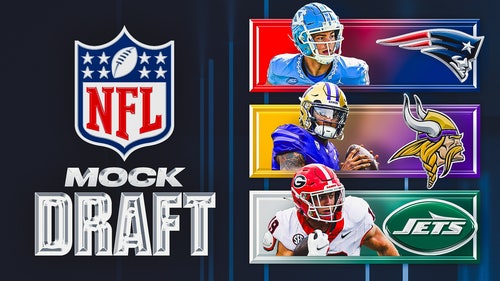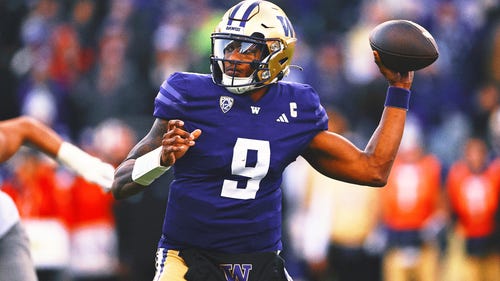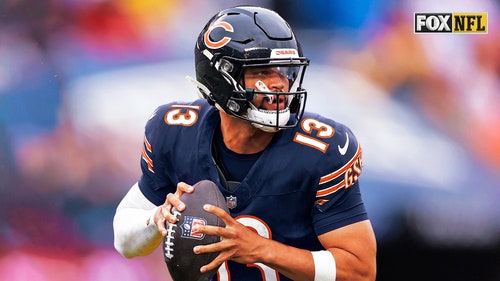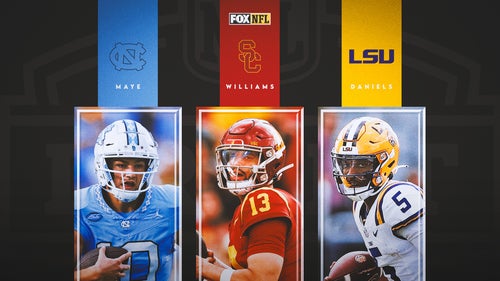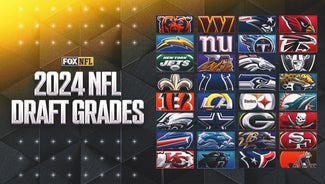
Is Vick finished as a franchise QB?
Michael Vick watched Nick Foles throw seven touchdown passes one week, then three more the next and came to the same conclusion everyone else did.
Michael Vick is done as a franchise quarterback, at least in Philadelphia.
He didn’t come right out and say it, of course, but Philly.com asked him if it bothered him to think about where his career might be headed, and he answered candidly . . . emotionlessly.
"Not really. It's a reality for me," Vick said. "I'd be naive not to think about where my career could be going, but the thing is, I know I can still play. I feel good about what I still can do, and that's what's most important."
He then more or less declared Foles the Eagles’ franchise guy.
"I think so," Vick said. "Nick will be a franchise quarterback in the NFL."
And so winds down the career of one of the most difficult-to-analyze quarterbacks in modern NFL history. He was never much of a passer, until he became one at age 30, which was about the same time the returns for taking off on the ground begin to diminish. That’s not an uncommon career arc for QBs like Vick, whose legs are a large part of their games
This being football, with all its variances in schemes and rules and eras, there are no perfect comparisons. But it is worth considering the careers of a handful of other quarterbacks renowned for their running.
Randall Cunningham
Oh, look, he played for the Eagles! This is perfect.
Cunningham was exceedingly Vick-like early in his career, by which I mean he did not complete 60 percent of his passes in any season until he was 29 years old. And yet he was a terrifying opponent because stopping him in the passing game hardly equated to stopping him in general. He ran for at least 500 yards six years in a row (1986-92, ages 23-29).
Vick was 30 the first year he finished a season completing 60 percent of his passes. His rushing career is spotty on account of playing time, but Vick has run for at least 500 yards in every season he has started at least 11 games and has led the NFL in yards per carry five times.
Aside from the 1991 season at age 28, which he missed after suffering a knee injury in the season opener, Cunningham started missing a lot of games at age 30 and was out of the NFL for one full year at age 33. He signed with Minnesota at 34 and in 1998 had a (Randy Moss-aided) 3,700-passing yard revival of a season.
Cunningham stuck around as a backup until 2001 (age 38). But after turning 30, his best running season was 288 yards.
Rich Gannon
Gannon’s career didn’t really even begin until he hit his 30s. He was 34 years old the first time he started an entire season (1999 in Oakland), then started 64 games in a row. That included a monstrous 2002 season in which he threw for an NFL-high 4,689 yards.
Gannon was mostly done as a runner by that point. His best rushing season came at age 35, when he ran for 529 yards, but he averaged 20 rushing yards per game just twice over a full season — and just once as an every-game starter (1999, Kansas City). He retired at 39.
Donovan McNabb
Another Eagle!
Most people probably remember the late-career McNabb, after he had decided running just wasn’t worth it anymore. But he was an effective scrambler right up until about age 30-31.
McNabb averaged more than 400 rushing yards during each of his first six NFL seasons, but played just nine games for the Eagles in 2005 (age 29) and never ran for more than 236 yards in a season again. McNabb, who retired after the 2011 season at age 35, was remarkably consistent as a passer throughout his career, averaging at least 200 yards per game 11 years in a row.
Doug Flutie
Flutie had a bizarre career that hardly works as a comparison to Vick, but he did run for 476 yards at age 37, and threw for 3,400 yards at age 39. But his spotty career also lacked the wear and tear of other consistent starters.
Steve Young
Like Gannon, Young’s NFL career didn’t amount to much until he hit 30, as he spent most of his time holding a clipboard for Joe Montana in San Francisco.
At age 37, he threw for 4,100 yards and ran for 454, both career highs.
Amazingly, from 1991-98 Young started 10 or more games in every season for the 49ers — and amassed 50-plus carries in every season. Similarly to Gannon and Flutie, perhaps the lack of wear and tear helped Young's longevity deep into his 30s.
But beyond being left-handed scramblers, there aren’t many similarities between Vick and Young.
Fran Tarkenton
We may be stretching the definition of modernity to include a man who was born before the United States entered World War II. It’s just that Tarkenton remains a popular reference point for the "free-wheeling, scrambling quarterback," even 35 years after his career ended.
He also had his best passing season in his 30s (notice a pattern?), throwing for an NFL-leading 3,468 yards in 1978 (his career-high at age 38), but had tapered off as a runner by his late 20s. He ran for 202 yards at 33, but never approached that total again.
This exercise was hardly meant to be scientific, but there are some morsels of truthfulness in there.
Quarterbacks who are good at running tend to rely on that early in their careers, perhaps as a way of perhaps compensating for the struggles that face all young QBs. As they grow and become more sophisticated passers, two things seem to happen:
(1) The advantages of finding an open receiver (combined with the confidence and ability to do it) start to outweigh the benefits of running, and . . .
(2) injuries and age eat away at the runner’s effectiveness.
Vick is unique because, although he is often injured, he is still as dangerous a runner as he has ever been. In six games for the Eagles this season, he has 308 rushing yards on a career-high 9.1 yards per attempt.
But, also uniquely, he has actually shown more of a regression as a passer. His completion percentage and passer rating both peaked (62.6 and 100.2) in 2010 and have both dropped each year since (though he does lead the NFL in yards per completion this season).
So, is Vick basically finished being the guy for an NFL team?
I don’t think there is enough evidence to say Michael Vick is done as a franchise quarterback. His injury history and regression as a passer are bothersome. But he still has athletic ability to spare, and history indicates that quarterbacks are a little bit like musicians — they never stop evolving until they either stop caring or just can’t physically do it any longer.
Vick can still do it, but it’s fair to wonder how much he still wants to.






































































































































